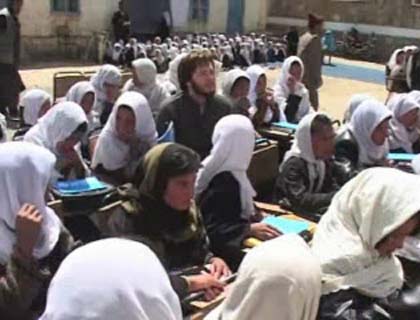As a result of the Soviet war, and the civil war which occurred shortly afterwards, many schools were destroyed and the education process as a whole in Afghanistan was negatively affected. The destruction of the education infrastructure went to an extreme level when the Taliban conquered and ruled most of Afghanistan. Today, more than a decade after Taliban's government was toppled millions of Afghan girls and boys attend schools. That is an achievement for Afghans. Nonetheless, threats to Afghanistan's education sector posed by Taliban's insurgency remain gravely high.
It was the Taliban's government when girls were not allowed to get education and boys had to only learn religious books. The Taliban have not given up there hostile attitude towards schools, teachers and students, especially the female students. In most parts of Afghanistan where Taliban have influence and control, hundreds of schools remain closed. Attacks on school with poisonous gases continue. Apart from Taliban's insurgency, numerous social and economic problems keep millions of Afghan children out of schools.
Long term conflict has made Afghan youths fell thirstier for education than any country. Proper education is one of the most important things to be made available for Afghan youths especially after 3 decades of war. 50% of the Afghan population which estimated around 30.4 million as of the year 2012, are children under the age of 15. Afghanistan has one of the highest illiteracy rates in the world.
Today, and according to the NRVA, the estimated national adult literacy rate (aged 15 and above) is 26 percent. In rural areas, where approximately 74 percent of all Afghans reside, the situation is more acute, with an estimated 93 percent of women and 65 percent of men lacking basic reading and writing skills.
With that situation, Afghan children, teenagers and youth need a peaceful environment to nurture in. However, such a situation is turning into a dream at an important juncture when the international security forces are set to pull out from Afghanistan and the insurgency seems to be more threatening to peace in Afghanistan than ever.
Last week, more than 120 schoolgirls and three teachers were poisoned in Takhar province of Afghanistan by individuals who people think are associated to government armed opposition groups like Taliban and Hezb e Islami.
This occurred at a time when NATO's important summit in Chicago – where security transition to Afghan security forces, withdrawal of international forces and Afghan army's future financial and training requirements were discussed – had just concluded. Afghanistan's intelligence agency, the National Directorate of Security (NDS), says the Taliban appear intent on closing schools ahead of a 2014 withdrawal by foreign combat troops. "A part of their Al Farooq spring offensive operation is ... to close schools. By poisoning girls they want to create fear. They try to make families not send their children to school," NDS spokesman Lutfullah Mashal said. Last month, 150 schoolgirls were poisoned in Takhar province after they drank contaminated water.
Afghanistan's Ministry of Education said earlier this month that 550 schools in 11 provinces where the Taliban have strong support had been closed down by insurgents. In central Ghazni province – selected as 2013 center of Islamic civilization – Taliban's anti-education is getting more intensified with the passage of each day.
Since the last month, the Taliban fighters have threatened students of about 119 schools in Ghazni province against attending their classes. That should not be surprising. In the last decade, they have intensively tried to prevent Afghans from getting education by acid/gas attacks on students, setting fire to schools and threatening people to keep their children away from education. The daring of Taliban to prevent students of 119 schools from attending their classes in Ghazni means challenging the writ of the Afghan government.
In addition to insurgency that is counted as the biggest hurdle to educational development, there many other social and economical problems that form reasons for more than five million school-age children not undergoing education. Not having enough economical strength has caused many families to send their children to works.
In Afghanistan child workers are employed in shops; work as street vendors and work in vehicle repair or metal workshops, tailoring and farming. In Kabul and many other major cities of Afghanistan, there are street children who shine shoes, beg, clean cars and collect and sell scrap metal, paper and firewood. Children can also be seen in garbage areas searching for things which can be sold for cash or get something to eat and kill their hunger.
In a major portion of Afghan geography, people are so narrow minded that they do not allow their children especially their girls to go to schools. The version of religious regulations practiced in Afghanistan is stricter than in many Islamic countries, although Prophet Muhammad (PBUH) has called education mandatory for both girls and boys. Lack of awareness in many provinces of Afghanistan causes people to go against female education which, in the long run, will have negative impacts on women's participation in different walks of life.
One more critical issue facing schools in Afghanistan, today, is lack of books. Pakistan that has been hosting millions of Afghan refugees since long has stopped containers carrying thousands of copies of Afghan school books for the last six months. Despite efforts from Afghan government, the problem still persists. It is urged that the Pakistani authorities should immediately allow the books into Afghanistan so that further loss to the education sector of this country can be prevented.
The withdrawal of US-led forces from Afghanistan is expected to put our education sector at further risk. Amid drawdown for foreign security forces, more emphasize is being put over resolving Afghan conflict through negotiation with Taliban. Any irrational compromise would cause the ten-year educational gains at the risk of being lost. The international community must continue bolstering the educational activities in Afghanistan. Only an educated Afghanistan is beneficial to the region and the world.

